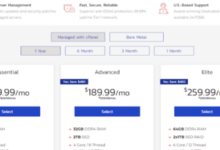The Benefits of a Managed Server
A managed server is a crucial component for businesses of all sizes. It provides numerous benefits that can greatly enhance the performance and security of your online operations. With a managed server, you can enjoy:
- Enhanced Security: The managed server comes with robust security measures that protect your data from unauthorized access and cyber threats.
- Increased Speed: A managed server is optimized for speed, ensuring that your website and applications load quickly, providing a smooth user experience.
- Improved Scalability: As your business grows, a managed server allows you to easily scale your resources to accommodate increased traffic and processing demands.
- 24/7 Technical Support: With a managed server, you have access to round-the-clock technical support, ensuring any issues are quickly resolved to minimize downtime.
- Regular Backups: Managed server providers typically offer regular backups, ensuring that your data is secure and can be restored in case of any unexpected events or data loss.

What is a Managed Server?
A managed server refers to a dedicated server that is maintained and managed by a hosting provider. It offers a comprehensive solution for businesses that require a robust, secure, and high-performance hosting environment.
Unlike unmanaged servers, where you are responsible for all server-related tasks such as installation, configuration, maintenance, and security, a managed server takes care of these responsibilities on your behalf. This allows you to focus on your core business activities while leveraging the expertise of the hosting provider.
How Does a Managed Server Work?
A managed server works by offloading the management tasks to a hosting provider. These tasks include server setup, software installation, security measures, regular maintenance, and backups. The hosting provider takes care of all these aspects, ensuring that your server is optimized for maximum performance and security.
When you opt for a managed server solution, you have complete control over your server’s resources and configurations. You can install your choice of operating system, software, and applications, customize settings, and scale resources as needed. The hosting provider will ensure that your server is up and running smoothly, as per your requirements.
Managed Server vs. Unmanaged Server
The main difference between a managed server and an unmanaged server lies in the level of support and management provided. With an unmanaged server, you are responsible for all server-related tasks, including installation, configuration, security, maintenance, and troubleshooting. You have full control but also need the technical expertise to manage the server effectively.
On the other hand, a managed server takes care of these tasks for you. The hosting provider handles the server setup, security measures, regular maintenance, backups, and support. This allows you to focus on your business operations, without worrying about server management. While you have less control, you can rely on the expertise and support of the hosting provider.
Frequently Asked Questions about Managed Server
1. What is the cost of a managed server?
A managed server’s cost depends on factors such as the hosting provider, server specifications, and additional services included. It is best to contact different hosting providers and compare their pricing to find the most suitable option for your business needs.
2. How does a managed server help with data security?
A managed server offers robust security measures, such as firewalls, intrusion detection systems, regular security updates, and malware protection. The hosting provider ensures that your data is protected from unauthorized access and cyber threats, minimizing the risk of data breaches.
3. Can I install custom software on a managed server?
Yes, with a managed server, you have the flexibility to install custom software and applications as per your business requirements. However, it is recommended to consult with the hosting provider to ensure compatibility and optimal performance.
4. What level of technical support can I expect with a managed server?
Managed server providers offer 24/7 technical support to address any server-related issues promptly. You can expect assistance with server setup, troubleshooting, performance optimization, and any other server-related queries or concerns.
5. How often are backups performed on a managed server?
Managed server providers typically perform regular backups to safeguard your data. The frequency of backups may vary depending on the hosting provider and the specific plan you choose. It is advisable to inquire about the backup frequency with the hosting provider before opting for a managed server solution.
6. Can I easily upgrade or downgrade my server resources with a managed server?
Yes, one of the key advantages of a managed server is the ability to easily upgrade or downgrade your server resources as your business needs change. You can scale resources such as CPU, RAM, storage, and bandwidth to accommodate increased traffic or optimize costs during slower periods.
Conclusion
A managed server offers numerous benefits for businesses, including enhanced security, increased speed, improved scalability, and 24/7 technical support. By offloading the server management tasks to a hosting provider, you can focus on your core business activities. With its robust security measures and regular backups, a managed server ensures that your data is secure and accessible at all times. Consider opting for a managed server solution to optimize the performance and security of your online operations.




